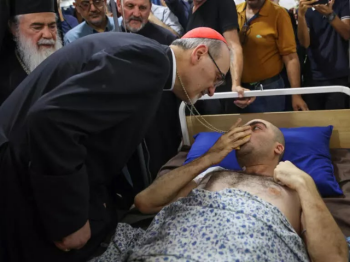“Christ is not absent from Gaza”

“Dear brothers and sisters, Patriarch Theophilos III and myself, have returned from Gaza with broken hearts. But also encouraged by the testimony of many people we met.” This is how Patriarch Pizzaballa began his speech during a press conference on July 22, upon returning from a three-day visit to Gaza following the attack on the Church of the Holy Family, the only Latin parish in Gaza. It is here, on the Gaza Strip, where for more than 20 months, the few hundred remaining Catholics have taken refuge, along with other Christians.
“We walked through the dust of ruins, past collapsed buildings and tents everywhere [...]. And yet, in the midst of all this, we encountered something deeper than the destruction: the dignity of the human spirit that refuses to be extinguished. We met mothers preparing food for others, nurses treating wounds with gentleness, and people of all faiths still praying to the God who sees and never forgets.” Among those ruins and collapsed buildings, we recall the memory of the three who died in the recent attack, which also left others injured, some of whom are still in a serious condition. May the death that has tragically struck so many in Gaza allow us a few words to instead recall the power and beauty of the lives lived by these three Christians.
About Saad Salameh, Sami El-Yousef, CEO of the Latin Patriarchate, recounts that he was “a gentleman, always with a big smile and courteous attitude”. He had heart problems and was a beneficiary of the medication assistance program and the job creation program in Gaza, both funded by the Order of the Holy Sepulchre.
Fumia Ayyad, 86 years old, had spent her entire life working as a teacher and principal in public and UNRWA schools. Her home had been completely destroyed in the early weeks of the war, and since then she had moved into the Holy Family compound. “Throughout her career she had tens of thousands of students who remember her as a very passionate and caring educator,” commented Sami El-Yousef.
The third victim is Najwa Abu Daoud, who had lost her husband just a few months ago due to lack of access to healthcare. She too, because of diabetes and high blood pressure, had for many years been part of the medication distribution program funded by the Order of the Holy Sepulchre, just like one of her four children, Hani, who suffered from kidney failure. Sadly, this condition led to his death during the war, again because he was unable to receive treatment.
“Christ is not absent from Gaza,” said Patriarch Pizzaballa with emotion. “He is there, crucified in the wounded, buried under the rubble, and yet present in every act of mercy, every candle in the darkness, every hand extended to the suffering.” One is reminded of the image of the brother lying on a bed who, during His Beatitude’s visit to Gaza, took the Cardinal Pizzaballa’s crucifix in his hand and kissed it with faith and love. From cross to cross.
“The Church, the entire Christian community, will never abandon them,” said Patriarch Pizzaballa without hesitation. And in this closeness of the whole Church, the Order feels especially represented. The steady support over these years to this small flock in Gaza, through targeted projects, support for education, humanitarian aid, medicine distribution, and job creation programs, makes the Catholic community of Gaza close to the hearts and prayers of all Knights and Dames: a community with faces, names, and stories. And while we may know our Catholic brothers and sisters more directly, it is nonetheless “important to emphasize and repeat” -echoing the words of the Patriarch and Grand Prior of the Order of the Holy Sepulchre – “that our mission is not for a specific group, but for all. Our hospitals, shelters, schools, parishes St. Porphyrius, the Holy Family, the Al-Ahli Arab Hospital, Caritas — are places of encounter and sharing for all: Christians, Muslims, believers, doubters, refugees, children.”
At the conclusion of the press conference, Cardinal Pizzaballa’s words rang out with clarity and force: “It is time to end this nonsense, end the war and put the common good of people as the top priority.” And finally, “Let us not turn peace into a slogan, while war remains the daily bread of the poor”. In echoing his words, the Grand Master of the Order, Cardinal Fernando Filoni, concluded with a forward-looking appeal, stating, “We cannot resign ourselves to hatred or resentment, which at times seem to dominate and prevail.”
Elena Dini
(July 24, 2025)



